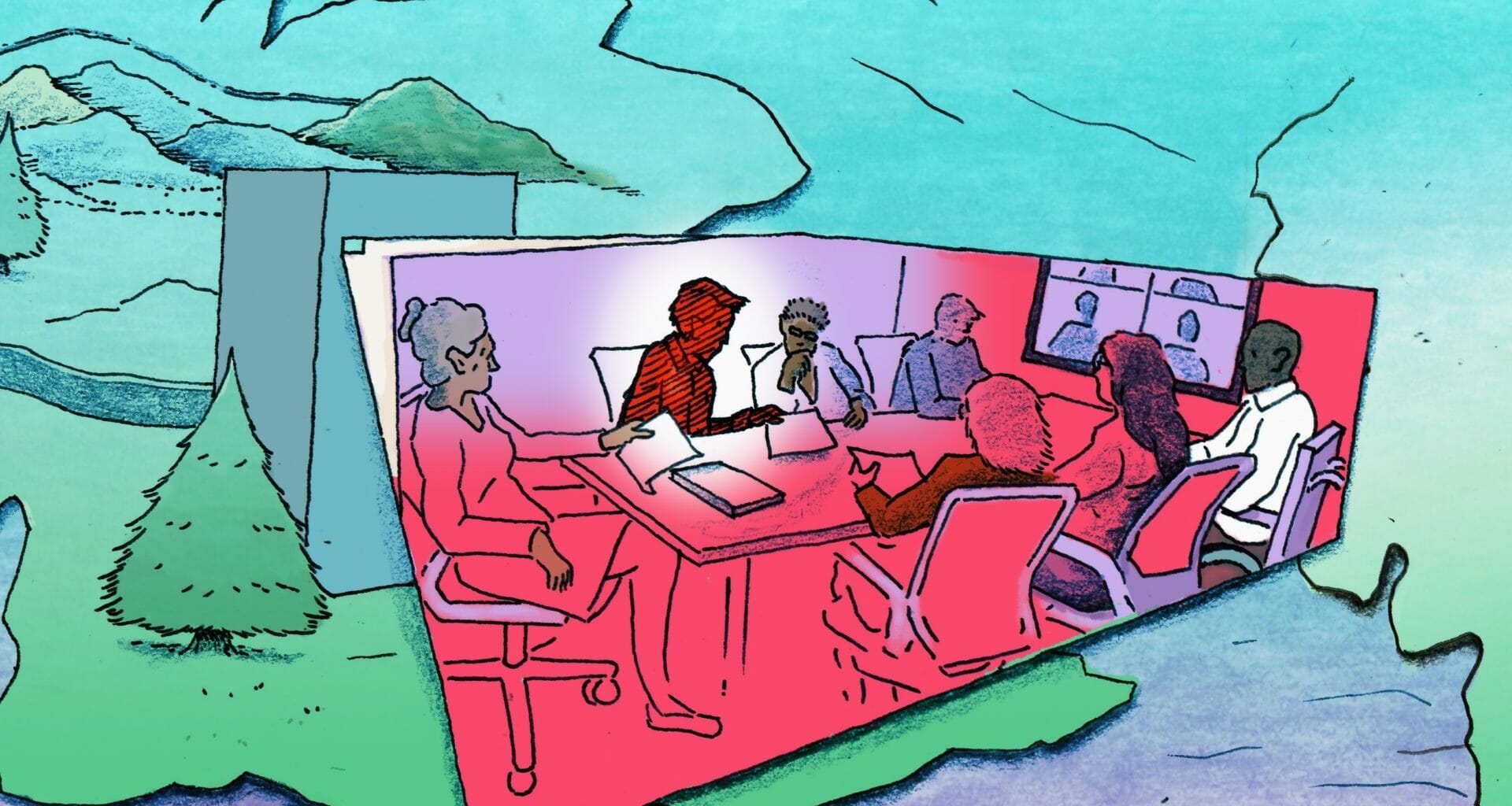
Influential bankers, retired senior civil servants, well-connected industry insiders, powerful chief executives and former politicians – meet Scotland’s quango class.
Some roles are unpaid, and many work extra hours in their devotion to public service. But analysis by The Ferret of 775 Scottish Government public board positions has also found a web of influential connections binding many serving in the public sector.
Some had been appointed to multiple roles on boards, moving across appointments in different sectors for more than a decade.
Pay varies hugely with some roles – especially prestigious ones in arts and cultural sectors – being unremunerated. At the other end of the scale Willie Watt, the chair of Scotland’s National Investment Bank, pockets £1,125 per day along with other Bank board members who are on a daily rate of £850.
The Ferret looked at all regulated public boards and found the highest earner was Dame Susan Rice – the first woman to lead a clearing bank, Lloyds TSB Scotland, and later became chair of the same bank, a role from which she retired last year.
She earns a total £130,512 for her roles, which includes chairing the Scottish Fiscal Commission, receiving £36,270 for 78 days work a year. She also chairs the board of Scottish Water 2.5 days a week, earning an additional £94,242. This is a role Scottish Water said required “the experience and skills found in large, complex and vitally important business organisations”.
While Rice currently holds only two positions on public boards she has a string of high profile board roles under her belt. A senior independent director of J. Sainsbury’s plc, and a non-executive with the North American Income Trust, Big Society Capital, the Banking Standards Board, she has previously been on the boards of SSE plc and the Bank of England.
Others are lower paid but currently combine multiple public roles. Paul Edie has served as the chair of the Care Inspectorate since 2013 and he is also a member of the Scottish Social Services Council. He is a non-executive director of Healthcare Improvement Scotland and joined his fourth concurrent public board – the Scottish Police Authority – in April 2021. He is paid a total of £56,000.
Prior to this, Edie had an extensive career in politics serving as a Scottish Liberal Democrat councillor for 23 years on Edinburgh City Council where he was the party’s group leader. He also chaired the Edinburgh Community Safety Partnership for five years and was a non-executive director at NHS Lothian.
The only other person filling four roles on public boards is Ann Allen, the CEO of the Chartered Institute of Civil Engineering Surveyors (CICES).

While she is not remunerated for work as a board member of the National Museums of Scotland (NMS), she receives £9,600 as chair of the Architecture Design Scotland Board, and £7,800 working two days per month as a board member of the influential board of Scottish Futures Trust (SFT), – the SNP’s alternative to PFI. She also sits on the Water Industry Commission for Scotland board, which brings in £13,780 .
A Chartered Surveyor with over 35 years’ experience, Allen has worked for organisations such as John Lewis, HBOS and the UK Government.
Scottish Futures Trust and National Museums of Scotland boards are chaired by chartered accountant and former executive director of Scottish Power, Ian Russell. Both boards attract well-connected chairs. Angus Grossart, merchant banker and chair of communications and political strategy consultancy firm, Charlotte Street partners, served as chair of the National Museums of Scotland board until 2012. He and his wife, the contemporary painter Lady Gay Grossart, are listed as benefactors of the NMS transformation in 2011.
Grossart was involved in the Scottish Futures Trust at its inception. He was appointed as the first board chair by the then-finance secretary John Swinney and remained in post until replaced by Russell in 2012.
Announcing Grossart’s post in 2008 Swinney said: “The establishment of the SFT, and the appointment of Sir Angus as chairman is a significant step forward for Scotland.”
The chairman of merchant bank Noble Grossart no longer serves on any Scottish Government administered public boards although he chairs Glasgow Life’s board and the Burrell Renaissance Board, which is overseeing the current refurbishment of Glasgow’s Burrell Collection.
He donated £1m to the project. Grossart, the former vice chair of the Royal Bank of Scotland, has a string of past roles including as an non-executive director of the Daily Record and Sunday Mail.
Another high profile financier now serving on public boards is Willie Watt, inaugural chair of the Scottish National Investment Bank, a role he is paid up to £60,000 per year for four days of work per month. Watt also serves on the board of the National Galleries of Scotland – a role that is not remunerated – along with Andrew Wilson, a founding partner of Charlotte Street Partners and chair of the Scottish Government’s sustainable growth commission, which looked at the economics of an independent Scotland.
The National Galleries of Scotland board is now chaired by former Tesco Bank CEO and RBS executive Benny Higgins, strategic advisor of the Scottish National Investment Bank. It is the only public board appointment that Higgins has. But he also sits on the board of the Edinburgh International Culture Summit – a biennial ministerial forum established in 2012 by the Edinburgh International Festival in partnership with the Scottish and UK Governments, the British Council and Scottish Parliament. Other trustees of the summit include Grossart and Wilson.
Other public board members researched by The Ferret currently only hold a couple of posts but have long histories of moving from board to board.They include Mike Cantlay, chair of NatureScot – the chief executive Francesca Osowska is a former director of the Scotland Office and was the Scottish Government’s director for Commonwealth Games and Sport from 2012-1014.
Cantlay also chairs the Scottish Funding Council, which is one of the ten highest spending public boards in Scotland with annual expenditures of £1,875,312. The other nine include two councils, five NHS boards, Transport Scotland and the Scottish Police Authority, which is chaired by Martyn Evans.
Evans only has one board position which earns him £95,400. Previous chief executive and director roles include those with the Carnegie UK Trust, the Scottish Consumer Council, Citizens Advice Scotland and homeless charity Shelter.
Cantlay meanwhile was previously convener of the Loch Lomond and The Trossachs National Park Authority and chair of VisitScotland from 2010 until 2016. Until 2020 he served as Chair of Highlands and Islands Airports Ltd.
It is now chaired by Lorna Jack, chief executive of the Law Society of Scotland and trustee and treasurer of the McConnell International Foundation, founded by former First Minister Jack McConnell who was appointed to the House of Lords in 2010.
McConnell’s wife, Bridget, has been chief executive of Glasgow Life since 2007 and has a place on its board alongside Grossart, working with him on the refurbishment of the Burrell. She was also an integral part of the “bid team” which won the Glasgow 2014 Commonwealth Games.
The games organising committee was chaired by another well-connected man, Lord Robert Smith of Kelvin.
His current public appointments include chairing the influential Scottish Enterprise board. He was chair of the Weir Group plc until 2013, SSE plc until 2015 and the UK Green Investment Bank until 2017, which last year held a private dinner attended by Scottish energy minister Paul Wheelhouse and a range of hydrogen companies. He also chairs the British Business Bank, IMI plc, and Forth Ports Ltd and is Chancellor of the University of Strathclyde.
Following the 2014 referendum on Scottish independence, then-Prime Minister David Cameron appointed him to head up the Smith Commission, tasked with examining further powers for the Scottish Parliament as outlined by the Vow – a pledge made by Cameron, Ed Miliband and Nick Clegg, ahead of the vote and published on its eve by the Daily Record. The newspaper’s editor then was Murray Foote, who is now the SNP’s head of communications.
Other current Scottish Enterprise board members include Willie Mackie, who also sits on the board of Skills Development Scotland and Colleges Scotland, giving him three roles on regulated public boards.
They also include Karthik Subramanya, who is currently a senior adviser to Boston Consulting Group, which has a wide portfolio of contracts with UK Government departments. They are one of a clutch of consultancy firms rapidly hired last year to work on the Covid-19 track and trace system, the purchase of personal protective equipment (PPE) and the search to produce working ventilators, with its contracts reported by Open Democracy to be worth £6.3m.
Subramanaya was previously a Creative Scotland board member. Other past senior executive positions include those SSE, Lloyds Banking Group and HBOS, companies which regularly appear in the CVs of several other public board members.
Notable former Scottish Enterprise executive directors include Russel Griggs, now chair of South of Scotland Enterprise. He has also served on the board of VisitScotland, as a Scottish Government non-executive director and as chair of the CBI’s UK SME (Small Medium Enterprises) Council during the financial crisis.
This investigation is part of our wider series Who Runs Scotland. We will be shedding a light on ownership and power in Scotland’s economy, environment and politics.
Help us hold power to account, for as little as £3/month.
Illustration by David Peter Kerr.















two points re Andrew Wilson:
1) he was also Deputy Chief Economist during Grossarts time on the RBS board.
2) the Growth Comission was an SNP party body rather than a Scottish Government one